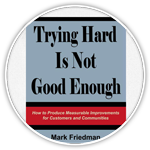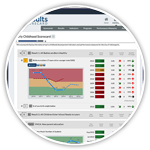People have been asking me for more detail on what I mean by “next generation” contacting (or commissioning as it is sometimes called in the UK). Here are some additional thoughts. I welcome your comments and suggestions.
Next generation contracts will have three essential provisions, and an optional fourth. Provision 1 (Most important performance measures) and 2 (Continuous improvement process) are sometimes used in present generation contracts, but these two with the addition of provision 3 (Performance partnership between funder and contractor) create the “next generation” funder / contractor relationship. Provision 4, having to do with simplifying and standardizing contractor reporting, is a highly desirable but optional component. Clearly there are many other components of a complete contract genome (see Dawkins) that are necessary to have a fully functioning contract, so these are necessarily parts of a larger whole.
1. Most important performance measures (Provision 1) specifies the most important 3 to 5 How well did we do it? (Upper right quadrant) and Is anyone better off? (Lower right quadrant) measures by which the contractor’s performance including its effectiveness on behalf of customers can be judged. If these measures are not identified in the contract itself, the contract should specify a process for quickly agreeing on the measures, with possible reference to the RBA 5 step process in Appendix G of the RBA book.
2. Continuous improvement process (Provision 2) specifies that the contractor will use a continuous improvement process (the RBA 7 Questions are naturally recommended) to monitor and improve performance over time. The contract must specify that this process takes place (usually monthly) at the highest level of overall contractor performance (usually agency or major program level) but should also, if possible, specify that the RBA 7 questions will be used (or phased in) to every supervisory relationship.
3. Performance partnership between funder and contractor (Provision 3) specifies that the funder and contractor will meet periodically (most likely quarterly) to jointly assess performance on the 3 to 5 measures, the story behind the baselines for these measures, and what each party can do to improve performance in the coming period. These meetings should be preceded by the submission of a performance report in RBA format (See Wyoming Part II and San Mateo budget formats) from the contractor to the funder. In these meetings, the funder and contractor act as co-equal partners in helping facilitate improvement. This means that the funder will also agree to tasks that can help the contractor improve, such as providing technical assistance, working to break barriers the contractor may be experiencing in getting access to necessary resources or cooperation from other agencies, essentially anything within the funder’s means that can materially support the contractor’s performance improvement. Nothing in this provision lessens the funder’s usual responsibility for oversight of the contractor’s performance and use of funds. Nothing in this provision substitutes for the grantee’s ongoing improvement process in Provision 2 nor for the contractor’s responsibility to pro-actively solve its own problems without the funder’s help.
4. Coordination with other funders (Provision 4) – optional – The funder agrees to actively pursue agreement with other funders who also purchase services from the contractor for the purpose of simplifying and standardizing contractor reporting requirements.
These are conceptual descriptions of the contract provisions and must, of course, be translated into actual contract language. Suggested language or examples of such language are welcome.



